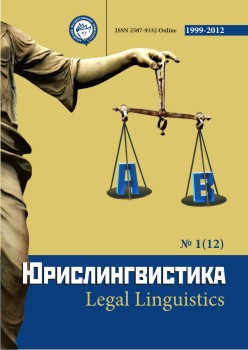THE PRACTICE OF USING THE LINGUISTIC EXPERTISE WHILE PROVING DRUGCRIMES COMMITTED BY THE GROUP OF PERSONS
Abstract
The article deals with the peculiarities of verbal behavior of communication participants, involved in the sphere of illegal drug trade. The order of the linguistic analysis of telephone talks is suggested and the peculiarities of the leader’s speech style are pointed out.
Downloads
Metrics
References
Алексеев, А. И. Расследование преступлений в сфере наркобизнеса /
А. И. Алексеев // Криминология: курс лекций под ред. А. И. Алексеева. – М.,
Аристов, С. А. Прагмалингвистическое моделирование мены
коммуникативных ролей: автореф. дис. … канд. филол. наук / С. А. Аристов. –
Тверь, 2001.
Зайцев, О. А. Криминалистика. Курс лекций: учебное пособие для вузов /
О. А. Зайцев, В. Я., Карлов. – М., 2006.
Карлов, В. Я. Судебная экспертиза в уголовном процессе Российской
Федерации: учебное пособие / В. Я. Карлов. – М., 2008.
Крысин, Л. П. О речевом поведении человека в малых социальных общностях
(постановка вопроса) / Л. П. Крысин // Русское слово, свое и чужое:
Исследования по современному русскому языку и социолингвистике. – М., 2004.
– С. 475–485.
Родченко, И. Г. Речевой стиль лидера / И. Г. Родченко. – Режим доступа: http://
www.psylive.ru
Комментарии к Уголовному кодексу РФ. – Режим доступа: http://
www.consultant.ru
Copyright (c) 2017 Юрислингвистика

This work is licensed under a Creative Commons Attribution 4.0 International License.
The authors, which are published in this journal, agree to the following conditions:
1. Authors retain the copyright to the work and transfer to the journal the right of the first publication along with the work, at the same time licensing it under the terms of the Creative Commons Attribution License, which allows others to distribute this work with the obligatory indication of the authorship of this work and a link to the original publication in this journal .
2. The authors retain the right to enter into separate, additional contractual agreements for the non-exclusive distribution of the version of the work published by this journal (for example, to place it in the university depository or to publish it in a book), with reference to the original publication in this journal.
3. Authors are allowed to post their work on the Internet (for example, in a university repository or on their personal website) before and during the review process of this journal, as this may lead to a productive discussion, as well as more links to this published work (See The Effect of Open Access).











